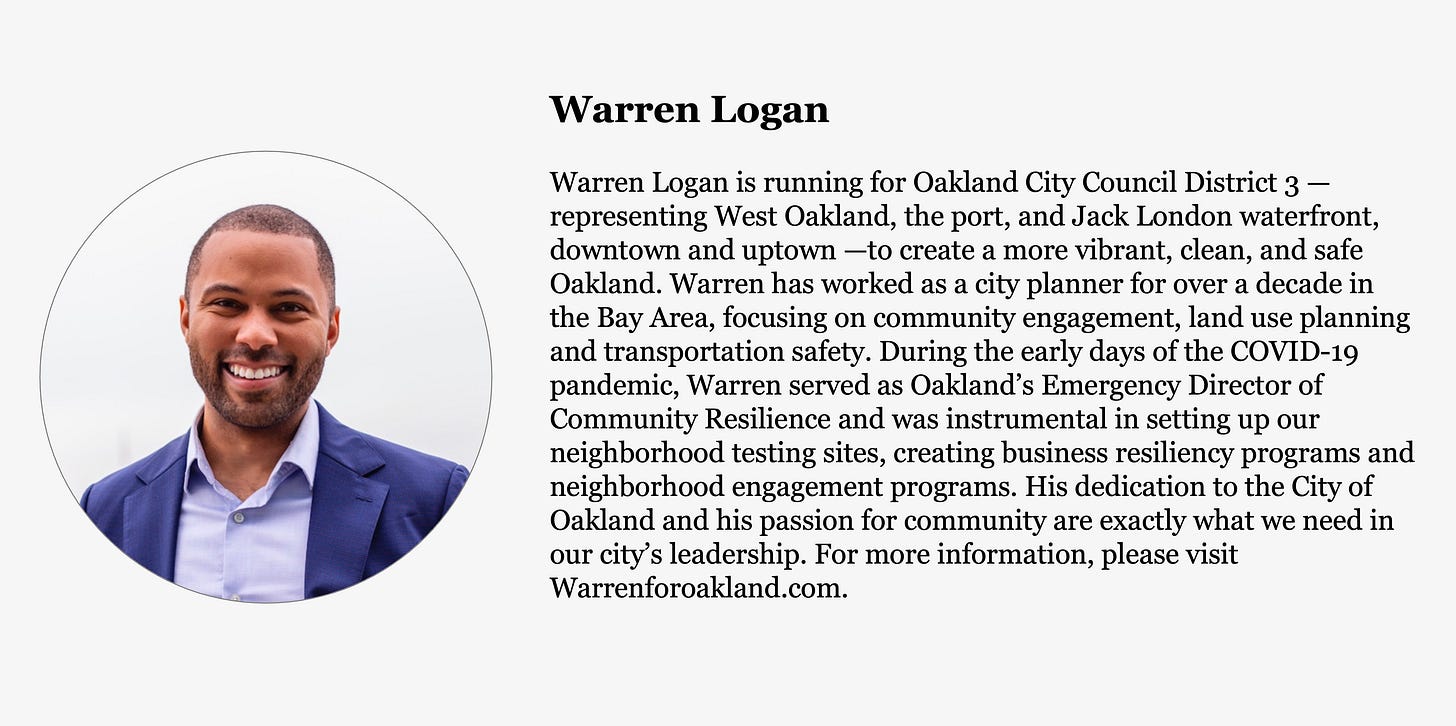About This Episode
Welcome to Housing After Dark, I’m your host, Alex Schafran. Today’s guest is Warren Logan, a planner and activist who has worked for city agencies on different sides of the Bay. He is now a candidate for political office, specifically of Oakland City Council to represent District 3, right down the street from where I live. Warren is one of the most thoughtful people when it comes to how our public sector operates, how transportation and housing fit together, and he backs up this thoughtfulness by doing something truly difficult — showing up consistently. I struggle with electoral politics, but given that 2024 will be an election year unlike any other, I knew I couldn’t ignore it much further. I hope you enjoy our wide ranging conversation which covers everything from his family history in housing, to the transportation/housing nexus, to why city planners should run for office.
This Episode’s Guest
Interview Transcript
Alex Schafran: Warren Logan, welcome to Housing After Dark. It's great to have you here.
Warren Logan: Thanks so much, Alex. It's great to be here.
Alex Schafran: It's a tradition now that we talk about how you got here as a houser, which is an interesting story because you spend a lot of your time in transportation. Most people start their housing story with themselves, but we're actually going to start your housing story with your grandfather, right?
Warren Logan: My whole family is very much involved in housing policy. Let’s start with my grandfather. My grandfather's name is Theophilus Logan. He passed away last April at 106. For anyone at a computer or phone looking him up you will find that he was the first African American Board of Realtors President in the Southern California District in San Diego and probably one of the first men of color to be a realtor in California for that matter.
Why is that important for both my housing story and probably any other black and brown person in Southern California? He was the quintessential element to helping people buy homes in neighborhoods with opportunity and resources in San Diego. His legacy is what drives so many people in my family to commit themselves to public service, to the community, and to find ways to better our neighborhoods.
Alex Schafran: This is another fact in my growing evidence that San Diego is secretly one of the most interesting and important places for housing in the state of California. I hope to get somebody from San Diego on the podcast at some point to talk about YIGBY and all the other things that are going on. How do we get from your grandfather to you as a houser? What's the story of your family's trajectory and then your own?
Warren Logan: One of the wonderful things about our family is that I grew up in a household that looked at problems and said, “How do we fix those? How do we get involved, and not just complain about them?” I went to college first to study architecture, because I love the design of buildings. I found over the course of my studies at Occidental College that I am more interested in the design of space which actually bridges the gap between land use planning, housing and transportation. That’s where my brain goes.
How do we create beautiful, vibrant spaces, that people feel welcome in, feel like they belong in, and that they are safe in whatever way that means? There’s this link between housing policy and transportation that connect them to different places where they're able to interject their culture into society while also being safe. That's really the nexus between my grandfather, my dad who works in housing as well, and myself. I focused on the policy of space, whereas my dad and my grandfather worked on improving the neighborhood itself.
Alex Schafran: That's a really interesting story about how you got connected to this broader politics of space. That does happen to a lot of us when we get into graduate school which broadens your view of the built environment. Sounds like you learned a lot about how California gets made at the dinner table, I'm not sure if you learned much about it in school. I'm a California Public School graduate and learned very little about it growing up.
At some point in this professional journey you go to work for the city and you go to work not as much on building buildings, but on issues of mobility, about humans moving around in the sea of buildings, and concrete and open spaces, etc. How did that happen? What exactly did you do in your position working for the City of Oakland?
Warren Logan: Honestly, the journey to even getting to the City of Oakland in the mayor's office was quite a story so I'll take us back. After Occidental, I went to UC Berkeley to get my Master's in City and Regional Planning where I focused on urban policy and urban design. At the same time, I worked for the City of Berkeley and their transportation division. I helped to manage this really cool Parking Pilot Program and my job was to engage with all the business owners and residents around what it meant to park in the city. We all know that that can be a very contentious subject.
Following my time at the City of Berkeley, I actually went to a consulting firm called Community Design and Architecture where I designed public spaces. I helped design the new Bart Plaza in Berkeley. It’s a funny story, I helped to apply for the grant money when I was at the City of Berkeley, then I went to a consulting firm that helped design that space. At the same time while I was there, I used a lot of that intersectional thinking in terms of design of public spaces and streets.
I actually helped design part of the beginnings of Telegraph Ave, before this most recent iteration as a protected bike way. One of the coolest projects I've ever done is helping BART do what's called a pro forma analysis. I stress tested the City of Oakland’s zoning code to figure out how much affordable housing BART could build on City of Oakland properties that they owned. It’s cool to see, nearly 10 years later, all of the projects that they're moving forward with on their properties that I helped inform them about a long time ago. After that, I worked for the County of San Francisco creating policies for shared mobility.
All of that took me to the City of Oakland in the mayor's office. The reason I share that with you, Alex, is that I like to remind people that I've worked at lots of different levels of the government, in different cities, for different parts of the country. I brought all the insight and lessons learned to then Mayor Schaff’s office and provided the best guidance I could on what the City of Oakland should do when it comes to mobility and, in part, what it meant for the City of Oakland to lead as a transportation champion for safe mobility for people walking, bicycling, taking transit, even driving in our city.
That job was phenomenal and also very challenging. Not only was I the Transportation Policy Director, I also was the Policy Director of Government Affairs. There’s this wonderful link between all of the things that are going on in the transportation world and other outside agencies that want to work with the city like PG&E, East Bay Municipal Utility District, and so on. And they still all have an impact on our transportation choices too.
Alex Schafran: I know that your career in the city also involved sort of stepping up as the Section Chief during the COVID emergency, dealing with things like testing and slow streets and flex streets. I did not realize that you had worked for the City of Berkeley, the City and County of San Francisco, and the City Oakland, the holy triumvirate of the northern part of the Bay.
One of the things that strikes me about your career is how you talked about the public sector and how you talked about working in government. I've been in and around this field for a very long time but I am a nonprofit guy, I'm an academic guy, I have never worked in city government.
What are the things that you feel like you've learned in this time about how cities operate? What are the challenges that you see? What are the things that you feel like cities are able to do well? Would you like to see places like the City of Oakland be able to do better?
Warren Logan: I try to reflect on all of the different lessons I've learned from every single agency. There are so many I'll try and winnow them down.
One is that there is a sense that people who work in the government are lazy, that they are not smart, that they're not committed to the city, and nothing could be farther from the truth. When I was at the City of Oakland, I supervised so many staff and team members that were from the City of Oakland, who grew up in the city, who drove that commitment from their community right into policymaking that impacted their friends and their family.
I think one of the misconceptions about Government (capital G) is that people are actively choosing to make things difficult. Anyone who's ever applied for a permit (and this is especially true of the housing space) is like “How is it that we say we want this outcome and yet, when I show up with all the right paperwork, it feels like you're fighting me on something that I think we both want”.
What that comes down to, I think, is the structure of government. I think this is where my expertise shines (I would hope) having worked in a lot of different agencies, different levels of government. My whole goal has been to try to figure out “What is the problem?”
Why is it that so many people who have come together to make our communities better, right, cleaner, safer, more vibrant, are not able to do that effectively when all of us seem to agree (mostly) on what the challenges are and what the solution should be. It turns out we're not set up for success. When you think about private companies, they try to be nimble. When they see that a department should be working better with another department, they reorganize regularly, they move people around to best fit their skill set. The government does not work that way.
This brings us to my time in the emergency team during COVID. We got to test what it looks like to shake up the government overnight and try to meet the needs of people in a very emergent way. What I want to highlight here is that most of the government in any city in any agency is set up by subject or function. So public works deals with the infrastructure of a city, for example. The DOT focuses on mobility with parking. The police focus on enforcement. The housing department focuses on permitting housing. The irony, though, is that most people would not set up government agencies that way. If you were to think about the way that you would structure your goals for your city, they wouldn't be organized that way. They would be organized around community safety, they'd be organized around mobility or vibrancy. And what that does is it ends up sort of cutting across each of those different verticals.
I bring you now to our community resilience team, which was made up of a bunch of people who are not epidemiologists. I want to start there given that we were responding to COVID, none of us were doctors. And yet each of us from the city administrator's office, the city attorney's office Public Works, transportation myself in the mayor's office, all of us brought something really special to that team. We were able to sort of cut across any one of our individual silos or departments to find synergistic solutions that were both meaningful and really met the moment whether that's testing sites in neighborhoods of need, slow streets, where we close down a number of streets throughout the city for people to walk around and just connect with their neighbors at a distance, or the flex streets program, which basically rewrote our parklets program, rewrote our special events programs, we even added food trucks in there at one point as well. It is not that the city didn't have a traffic safety program before COVID. It is not as if the city did not have a parklet program before COVID, or a special events permit before COVID.
What makes that moment so special is that we finally brought together all of the people who really had a say in all of these different issues and were able to align on a shared vision quickly which is the opposite of the way the government is typically structured. And maybe for the better, right that our government is not structured to move quickly. Right? You actually don't want it to do that. Because with bad actors, you want something to be slowing them down.
Alex Schafran: You raise a couple of really important issues that cut across the sectoral lines. One is this question, “Are you structurally set up to do what people want you to do?” It's not just the public sector that is often not set up in that way. If you look at housing or the housing industry, both the nonprofit and the for profit side, I would argue, are not really set up to build the 21st century housing system that we need.
There’s an earlier Substack that I wrote about Housing’s Missing Mirror about the lack of self reflection in the housing industry. Every time I hear somebody talking about the housing crisis, everybody's pointing fingers about all the reasons why they can't do what they want to do. And nobody's asking, “Hey, are we not set up to succeed?” I would love to hear from public sector, private sector or nonprofit sector folks. The answer, in my opinion, I think, is just no, we're not really set up.
Warren Logan. No, we’re not. I want to double click on something you just shared, because it makes me think about even the way that we talked about who was responsible for fixing the problem. We often divide the responsibility in three places. I'm going to repeat back to you what you just said, the government, nonprofit actors and the private sector. And frankly, you hear this with a lot of people, “Oh, well, the City of Oakland built too many market rate housing units.” Well, the City of Oakland didn't build anything. The City of Oakland permitted outside actors, right.
Whereas for example, and this is the reframe that I'm calling on you, and myself and your listeners, is to think about how the three the three of us (government, nonprofit actors, and private actors, and by extension, trades unions, prefab teams) how do we work together to meet the need? Because at the end of the day, all of us still live here. All of us are impacted by the crisis itself, right? The people who work for those non profit housing development corps, developers that build market rate housing, the housing department, they live in Oakland.
All of us at the end of the day are residents here. We can go back and forth fighting about whose fault it is or who needs to fix it first, or who needs to be working harder, but the rent is always due. I think about that a lot. No matter where we land with whatever solution, I have bills to pay, and I want to fix this problem as fast as possible.
Alex Schafran: I love by the way that you use the term responsibility, as opposed to accountability, which is more like whose fault it is if it goes wrong. We need a lot more people taking responsibility than we need to be worrying about who's gonna get blamed when we don't do anything. If we don't take responsibility I promise you that it will go wrong.
Warren Logan: You kind of see this, without taking too many jabs here, with our current electorate. I think a lot of cities and governments do this. We blame the last group of people who were in charge. And I don't know if that's helping the conversation. And this kind of circles back to my point about the government being set up to succeed. If your goal is as an elected official, or even as a department head, or even just a staff member, if your goal is to build trust in this thing that we're doing called government, it is not very helpful to remind people who messed up the second before you got there.
I'm more interested in understanding how you're going to fix it, because whoever was in that seat before you, they're gone. And so unless there is a lesson learned about, hey, we all took a step to the left, and we should have taken a step to the right. Unless you're showing us how you're going to be pivoting, you're not actually advancing the conversation that gets us to a solution. You're mostly deflecting responsibility, right?
If the goal is to say, “Well, I didn't do it. It's not my fault.” Are you also saying it is not your responsibility to fix it? I wasn't born in the 70s. I didn't vote for Prop 13. But here we are. And I could spend hours on this show, talking about how that is the quintessential reason that California has gotten itself into this housing crisis in its perennial budget crisis, but that doesn't help anybody because sure I wasn't alive then. I didn't vote for that. I didn't write the bill. But it is partially my responsibility to address the consequences of that proposition.
Alex Schafran: I was born in the 70s. I'm happy to report that neither of my parents voted for Prop 13 or so they told me. Well my mother told me, my mother is now no longer with us may she rest in peace, now her legacy is complete.
I've been thinking a lot, especially now that I'm on a variety of different boards and now that I’m an employer, I think about this question you mentioned about how do we set people up for success? And I think about it with regards to candidates and elected officials. I think that is part of our refusal to accept responsibility for our own actions as a private sector as a not for profit sector. People in particular aim a lot of vitriol at the public sector, without asking themselves, “How am I setting these people up for success?”
Most elected officials come from the nonprofit or the private sector. Much of the power over whether things happen still remains politically outside of the public sector. This is not France, this is not China, we are not a system that routes a huge amount of power in the public sector. And that's the big question. I think about this with regards to you or to, for instance, to Zack Unger, who's running as well that will represent my district. Am I putting him in a position in which he can be successful?
I wish more people would ask that question about politics, rather than “Oh, who is the better? Whose fault?” I think the question is, are we setting people up politically to be able to do the things that we want them to be able to do? And the answers I think, generally no.
Warren Logan: I think the answer is definitely no. I think one of the key issues about setting people up for success is being clear on what their responsibility really is and what their mandate is. And just for your listeners in case we didn’t establish this, I am running for City Council District 3. And you mentioned Zach who is running for District 1, my neighboring district.
WhenI think about setting your elected officials up for success, I think about what I would need. One is, what am I being held accountable to? I've read a number of change management and design thinking books and they always start with the same sort of treatise, which is: What is the problem that you're trying to solve? And how are you going to measure success?
If you don't have a definition of the problem, and you don't have additional definition of success or metrics towards that ultimate vision, then it's very easy to lose trust in the system that we call government. That to me is one of the fundamental issues that we keep running into with any elected official, or any government for that matter. No one is quite clear on how we're measuring stuff.
A lot of folks have talked about public safety. And I think that we kind of know what public safety statistics look like, whether it's property crime, whether it's homicides, right, like that's something you can count. But we don't apply that same rigor to virtually any other department in the city. A few years ago, we had a fire chief, Reggie Freeman was our fire chief in the city of Oakland. Every day he would tweet out the run stats for the fire department. He would tell people, okay, station one, you know, had 30 calls for service of those 30, 10 were for structural fires 10 were for EMS, and 10 were for encampment fires. Each day that he did that it would invite people to one recognize that we'd never done that before, which I just found fascinating to see how many calls for service we have every day for fires.
But it also prompted people to understand the intersectionality between the fire department and our encampment management team. And I don't want to stray too far into the cities encampment management or homelessness. But the point I'm making here is that, month over month, he started showing people that whether you liked it or not, the fire department was a quintessential response team to fires at encampments and by extension became our de facto encampment management program. Most people would not think that the fire department is responsible for the homeless response. They would think of our encampment management team. When we think about setting up the city for success, we want to be thinking about who is accountable for what? And what are we measuring for success?
There's this ephemeral quality that I think we all share with our constituents and ourselves that's like, “I'm upset, but I don't know how to hold you completely accountable. I know that things aren't going well. But I don't really know how to measure that.” That is a recipe for distrust and disaster and I want to fix that.
Alex Schafran: Well, I appreciate this. And even if I'm professionally trained to be skeptical about numbers, I do appreciate that it gives people at least a sense of what's going on.
Warren Logan: I mean, most people don't know what their city does, right? If I asked you to name all of the city's departments, right, you're paying taxes just like me. Ideally, you would know where your money's going.
Alex Schafran: We don't learn at any point in our California public education (this is in the back of the Road to Resegregation in case anybody wants to read my opinions that I've written about it before), anything about how any of this gets built. Nothing. It’s wonderful to learn about George Washington and Abraham Lincoln and people probably know more about how Congress passes a bill than about how your local city council manages any aspect of infrastructure. When you take a poo, where does it go? The average American does not know the answer to that question and knows nothing about how they pay for it.
The only time you ever see people really seem to understand things is when you read about the politics of plowing snow in Buffalo where it's like, “Okay, the city plows the streets. I care about the streets and I can see whether they're plowed or not plowed.” But this is something that is difficult. I want to put a pin on this, because we're going to come back to this question when we get to the end, which is the question of whether city planners should run for office.
But I want to bring us back to you and your career. After a long time in public service, you spent some time in the private sector. That’s an experience, if I’m not mistaken, that also got you a little bit back closer to housing to building buildings. Tell me a little bit about that experience and what you learn from this.
I know in some places that it's controversial. I don't understand how this can be controversial in the United States of America where people bounce between private, nonprofit and public sector all the time. It's just normal. Maybe it's healthy, maybe it’s not. It is the way it is. I think if we’re gonna have all these sectors you might as well blend people together and we want them to collaborate. Tell us a little bit more about what you did and what you learned.
Warren Logan: I joined a public affairs firm in San Francisco after I left the mayor's office in 2021 so I could continue working in a fast paced environment, one that would give me an opportunity to learn about a group of people that I'd really never met before. I want to take you through that line of thinking because it really highlights the way that I've treated my career.
While I was at the mayor's office I recognized that a lot of people and a lot of constituents of ours would share frustration about the way the media portrays the City of Oakland, or the way that a developer engaged with the community.
And so I said, “Why not go learn about how that works? Why not meet with them and understand what their motivations are?” so that when I come back to the city I’m better informed this actor. While I was there I supported their teams on policy analysis and community engagement.
What was really neat about this opportunity was that I was given sort of the insight behind the curtain. I could meet with developers and understand “What are they thinking about building housing?” We've talked about this before, they’re our third group. We've got the government, nonprofit actors, and for profit actors (the developers). That was a group I really wanted to learn more about. Let me highlight a few things I found fascinating.
The first of which is that they want to build housing. I think people forget that. Developers want to build housing, which on its face should be something we all generally agree with. The second is, when we talk about the cost of housing (that ultimately relates to the cost that each of us are individually paying for rent or for mortgages) we think of land, labor, and materials. There is a fourth component that I didn't learn in my master's program that I want to share with your listeners, which is time. So it's land, labor, materials, and time.
How long does it take to go from project conception, entitlements, building, certificates of occupancy and full leasing? That amount of time actually impacts the cost of housing. And all of that is city policy. So when I think about what role the city can play in its partnership (whether adversarial or otherwise) to private actors. If we as a city want the cost of housing to go down, we need to shrink the amount of time it takes to build and permit that housing. That was something I didn't know before working with a number of these developers is how much time it really took for them to get shovels in the ground.
The final element I want to show is (and this is so technical), but it's the kind of way that I want to learn is that cities exact fees on developers (impact fees for transportation or for sewer). The schedule that we collect that money is not aligned with the schedule that a developer pulls loans out. Alluding back to my time component, depending on when we ask for $10 million in fees, we might actually be driving up the cost of housing, not just because we're asking for $10 million. but because we asked for $10 million in fees in the second year of the permitting instead of the fourth year of permitting.
We might have just caused a whole bunch of units to have their rents go up by $500 each. That is something that is so nuanced but it's the kind of thinking I want to learn about so that as a policymaker, I can find laser focused solutions to helping people live in Oakland more affordably.
Alex Schafran: The cost of time is so profound in housing. I do think that there is a lot of responsibility that lies with the private sector, and other sectors, when it comes to the delays. I also think it's one of the important things where sometimes good planning takes time. And if time is seen as the enemy, because time is costly, then you're putting affordable housing and sometimes good planning at odds. And I think that's a lose-lose situation.
One of the things that we need to do in policy is make it so that time costs less. If we have a regular machine for the production of housing where we're able to put things out regularly, it doesn't matter. If there's a certain amount of units being produced every year, it doesn't matter as much, we can make it so that it doesn't matter if it takes two to three or four years from conception to production if it costs less.
Right now, the rates for construction lending are so insane that time is money and time doesn't have to be money. There are ways that we can produce a more patient real estate industry that is able to produce at high consistent rates. Maybe it's slower or it's the same speed. Making the factory kind of move faster without solving all the crazy cyclical crisis base aspect I think won't entirely get us there.
It’s a really interesting point. Having had a varied career myself, I really respect the fact that you have been willing and able to learn different things from different places in this way. This is one of the most healthy training grounds for all of us. I can't imagine my career had I stayed in the same place the whole time and it's amazing the types of different lessons that you can that you can get to.
I think one of the things that distinguishes you is, and I hope that I am in this category, is that you can't help but think about the larger system. At the end of the day, there are many people in our housing system who define success only based on their own relatively narrow self interests. Rather than looking around like, “Alright, here's this bigger system. And we need all the little pieces to work together. And how do we make that happen?” It's a hard thing to do and unfortunately, there aren't that many people that have that ability.
To tell you the truth, it's the kind of thing that I am looking for in leaders, not just in the public sector, but it's desperately needed for leaders in the private sector and the nonprofit sector. It’s seeing not just beyond their organization, but beyond their sector. In the nonprofit sector, we struggle with folks who are not able to sort of see how they play a role in setting up the other sectors that they need to do their jobs, to be able to be effective partners in some sort of cross sector partnership, to fix our systems.
On that system note, let's get to the other one of the other ways that I got to know you is that you're one of the most sort of relentless “housing + transportation” kind of people. I want you to give me your thoughts about why it's so important for housing and transport to be connected. In particular, if you're imagining that this is mostly housers listening, what are the things that houses need to really understand about this connection and how can they better work with their transport colleagues for more holistic urbanism?
Warren Logn: Take it from a transportation planner. Most transportation issues, whether it's congestion, traffic safety, all of that is based on land use, and namely, where you build housing. So let me give you an example. If we as a community are focused on building housing farther and farther away from job centers, you've created a what's called sort of a “transportation vacuum”, where you're causing people to have to commute, in our case, especially hours, to get from the Valley over to the Peninsula, for example.
From a transportation planners’ perspective, and I’m not the first person to say this so I don't want to take credit for it, one of the most powerful, if not the most powerful, transportation policy is actually housing policy. Locating housing next to jobs, resources, schools, transit, and other housing, is the best way to solve most of your transportation issues. I feel quite fundamentally that even if we never touched a street, and just focused on building denser and denser housing, you would end up with the positive climate impacts, fewer vehicle miles traveled, fewer traffic collisions, more people walking and bicycling and taking transit, just because they were within walking, biking and transit distance from their destination. That’s why I feel that there's this amazing affinity between those two areas.
Alex Schafran: So how does this work practically? I know you were on the Board of Transport Oakland, I know you've worked hard at the intersection of housing and transport in the advocacy space, I know that you've done it in the public sector. I was just fortunate enough to give a talk to the California Association of Councils of Government (Cal COG) Conference, which is mostly the big MPOs like MTC. It was mostly a lot of transportation planners. I actually came on after Gustavo Velazquez, who's the California Department of Housing and Community Development Director who's now been there a couple of times.
There's talk at the conference about how housing is more and more part of the conversation in regional governance especially in agencies that were ultimately transportation agencies for many years. But practically in your experience, what are the keys to actually making it work on the ground, whether in the public sector or between public sector and private actors, the nonprofit sector? How do we actually kind of weave these two fairly distinct professions at the end of the day, together?
Warren Logan: I think you have to tie their metrics of success together. And I'm glad that you mentioned MTC and the COGs, because until very recently you're right, they were only tasked with transportation policy, and really not even with policy, with investment. That's different.
About 14 years ago, the state passed SB375. That policy requires that your COG ties together its land use regional housing needs allocation strategy to its transportation investment strategy. The timeline for each is now bound by the same eight year cycle, so they come together which was something that didn't happen until very recently. This goes back to my point earlier about setting everyone up for success. Having our timelines be at the same time and causing our land use and transportation planners to work together.
One of the shortcomings I think the state is now addressing is that while you can invest at a regional level from a transportation perspective, land use policy is set at a local level. Getting a region to coordinate its land use policy is challenging to say the least. That's why I think you're starting to see a lot of state actors, especially from the Bay, making the consequences for not building your regional housing needs allocation numbers bite more than they did before.
I do believe, though, success will need a regional actor that has either some land use authority, and/or has land use investment. In the Bay Area right now, I think voters will have an opportunity to vote on this this fall, is the Bay Area Housing Finance Authority. Just like our regional body invests in our roads, and our transit systems, etc., we need a regional body that can also invest in affordable housing so that they're coordinated and ideally, that cities participate in this effort as well.
Until we have that, no one city is an island. When it comes to housing outcomes or the affordability or lack thereof that all of us are experiencing, there is no one city that can resolve that. Either all of those cities need to band together individually, or this regional body, MTC ABAG, needs to have some say in the matter.
Alex Schafran: I know that Housing After Dark listeners know a little bit about BAHFA because the interview with Kate Hartley is the number one most popular thing on my whole Substack so I'm glad that they're listening and I appreciate what you're saying. This does seem to be an important direction, linking up some of the RHNA allocations to some of our TIS goals.
One of the many reasons I'm excited about BAHFA is the possibility of some really creative financing options in and around TOD sites that can be transformative in many ways, in terms of the line between affordable and market rate (which is a silly line that I will write more about). I think you can create a lot of opportunities eventually for homeownership at the sites. I think we can really kind of use this opportunity to be transformative in terms of how we do housing.
Warren Logan: I'm sure Kate didn't say this, because if I were Kate I wouldn't say this, but one of the things that I think BAHFA is going to need to do to be successful is to, for lack of a better term, twist some arms and leverage the money that it's going to be pulling from a bond. Which is to say, it shouldn't just invest in affordable housing. Of course, that's its mandate, but one of the tools that MTC has used very effectively over the last 10 years, is requiring cities who want to be eligible for their money to adopt certain policies. We saw this about 10 years ago, when MTC required all the cities to adopt Complete Streets policies, meaning when you redesign a street and if you spend over a certain number of dollars, you have to consider all of the roadway users. That's why a lot of cities that were not pro bike lanes for example, suddenly have bike lanes everywhere.
The same strategy can be used for BAFHA. If you want to be eligible for our affordable housing dollars, you need to zone your city and namely what's called Priority Development Areas to use this money effectively. A similar example is the way that BART has land use authority where they can just build as much as they want on their property. Somewhere in between cities playing ball or BAHFA getting land use authority (which I don't think anyone's talking about, but that it'd be kind of fascinating) I think that that's the strategy we as a region are going to need to pursue to use this money effectively. Otherwise, we're going to be underbuilding sites that should be much denser because cities are not allowing for the density that really needs to go where it is.
Alex Schafran: Going back to this question of setting people up for success, I hope that the folks behind BAHFA recognize that BAHFA can only succeed if we set it up to succeed. That means not just trying to use that money (if we get it) to continue doing more of what we're already doing, but use it as an opportunity to really transform how we do affordable housing, what affordable housing can be, for whom it can be, how the various corners of the development industry do and do not collaborate around this “affordable housing”.
If we use it as a transformative moment, I think people will see it as a transformative agency and will not only vote for it in November 2024, but continue to support it, which it will need moving forward in order to be successful. I'm sure there'll be another BAHFA episode between now and November 2024.
Okay, so final question. You'll notice I didn't actually ask you a lot of questions about your candidacy and about your position on this policy or that policy because I don't really care. I don't actually think it's the right question. I wish the SF Chronicle and all the endorsers would ask different questions.
To me, it's far more important to understand how a candidate or how somebody who wants to be in a position of leadership in the public sector understands how the systems fit together, the actual systems themselves, public/private/not for profit, and why we talked about the things that we've talked about.
There are two related questions that keep coming back to me 1) Why would you do this? It’s a difficult job to do in a very difficult time. But obviously, you've made the decision to do it. And the bigger question, in some ways is, 2) Do you think other people with a city planning background with a housing and transportation background who understand these systems need to run for office?
Let me give you one quick point about why I think about this. There was an article recently in the New York Times about an amazing revolution that's happened on the St. Paul City Council. Almost the entire council is almost entirely women of color. In the article there was a small thing where they noticed that there are a few lawyers and some activists (all these people who I guess it's normal that they run for office) and they said there's even a civil engineer.
Going back to St. Paul, I imagine that plowing roads during winter is a central electoral issue. The idea that even a civil engineer would run for office is insane to me and points, I think, to the undervaluing of the technical knowledge and political knowledge of these systems. No offense to all my lawyer friends, but law school is not training for maintaining streets and for building affordable housing, and for maintaining our public health system and all the other things that we expect out of the public sector at the local level.
I want to have a lawyer on my policy team, because it's good for the mechanisms of making laws but I don't think it's serving us. I think that’s the other thing that's interesting to me about your candidacy. That’s the very long winded way of asking you, why do you do this and should more city planners run for office?
Warren Logan: I'll answer that in reverse order. Yes, more city planners should run for office, and I will answer your first question with a question. Do you think that people with pilot's licenses should be pilots for airlines? Do you think that people who are designing your buildings should have an architecture license? I don't mean that glibly, I mean that quite sincerely.
A number of the issues that I've seen especially in Oakland, we happily elect activists and advocates to our council because they have phenomenal stories that galvanize people towards a shared mission. The issue is that none of them are trained in running the government. And that's the job. It's not sexy sometimes. But you actually have to care about when the certificate of occupancy is issued to actually talk about affordable housing.
As I've shared with everyone I can that I'm running for District 3 City Council and then I share my background, all of them have said the same thing. “Well, that makes sense. Well, that seems like the right background.” And then they reflect, “Wait, do other city planners not run for office?” And it's in that moment that I know that one 1) I'm doing the right thing by running for office, and 2) that we have, as a nation, focused on electing leaders who are not necessarily prepared or equipped to do the work that we're calling them to do, and then get more frustrated when they are not able to perform the task at hand. Which causes us to distrust the very government that we already don't trust. That cycle is well worn.
I really hope that what people see in me is not just my policy background but to your point, Alex, how do I think. How I'm able to sort of connect all these dots together, that very few people think about on a regular basis, and show people what it looks like to have someone who has driven the bus before riding the bus again.
Alex Schafran: It's so critical. And I appreciate you saying this. There's so many aspects of this technical or understanding the bureaucracy, and understanding how things work, or don't work, is so important.
Warren Logan: Even if you don't want them to work that way. I sound perhaps like, here's the biggest word I know, an antidisestablishmentarianism. But genuinely, even if I wanted to shake up the government, which I actually have, I need to know where to shake. I need to know what to reorganize. This is an odd story, perhaps, but whenever you've seen a bank heist video, what's the first thing they do? They unroll the plans for the whole bank, they've got the schedule for the guards, they know when people shift changes. They've studied the bank before they make the bank heist. Not that I'm trying to heist the bank here, but my point is that that's how I see running the government, which is trying to understand all of that nuance, so that I know where to press, I know where to shake, I know what's working, and what could be even better. And what we're missing.
Alex Schafran: It’s my hope that folks like yourself or anybody else who is running for office or ends up in office that has worked across different sectors, that understands systems (housing systems, transportation systems), sees it as an interlocking set of systems. The goal is to get that system to work and to be a leader and that means occasionally figuring out ways to use that bully pulpit, not just to get the public sector to work, but to get the nonprofit sector and the for profit sector to work differently.
To actively set those conditions up so that you can succeed and help you help them create those conditions in which they can succeed and then we can all succeed. That is missing. There's too little knowledge about how our actual systems work. Now, some of that's on us. I mean, I don't know what your planning education was like. We learned a tale about planners overreaching in the 1950s and 1960s, really thinking they knew everything. And we helped create this political environment in which people distrust expertise.
Warren Logan: There’s a book called the Death of Expertise. It’s phenomenal.
Alex Schafran: Yeah it’s phenomenal. Is that the one about the economist? There's also a book about the experts. Sometimes the experts are economists and they're not really experts at anything. Sorry, economists. But this is one of the things that we really have to get to if we're going to restore faith in the system. We have to help people understand how the system actually works. Maybe start teaching it to people growing up and be like, “Hey, when you press the toilet, here's how it goes and here's how your tax dollars support that sewage system.” or that transportation system or wherever, whatever the system is that we have.
Warren Logan, thank you so much for being on the show. Any last things that you want to say to this group of housers or non housers who listen to the show?
Warren Logan: First, thank you for having me on the show. It's always great to chat with you and wonk out about housing policy. To your listeners, I encourage you all to vote, you don't have to vote for me, but just vote. Don't just vote at the polls, stay engaged, show up to city council meetings, call your legislature to make sure that your voices are heard about this quintessential issue we call housing. Be vocal about what it is that you want and what success looks like so that we are holding each other accountable to ideally our shared vision for a more affordable, vibrant Bay Area.
Alex Schafran: Thank you, Warren. I hope everybody out there also takes a moment to reflect and ask how they, their organizations, their company and their departments are setting themselves or setting other people up to succeed. I think that's the only way we're going to be able to move forward. Thank you so much for being on the show. Great to have you.















Share this post